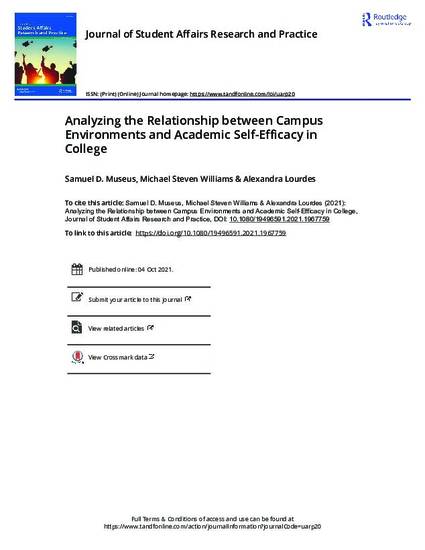
Article
Analyzing the relationship between campus environments and academic self-efficacy in college
Journal of Student Affairs Research and Practice
(2021)
Abstract
Low persistence and degree completion rates are of paramount concern for higher education researchers, policymakers, and practitioners. There is some evidence that students’ success in higher education is partially a function of their self-efficacy beliefs, but little is known about how campus environments shape academic self-efficacy. This study aimed to understand the relationship between culturally engaging campus environments and four-year college students’ academic self-efficacy. Authors used regression analysis techniques to analyze a sample of 704 college students at a public four-year university on the East Coast. When controlling for demographic variables and self-reported growth in academic self-efficacy during high school, three of the nine indicators of culturally engaging campus environments were directly associated with positive growth in academic self-efficacy during college. A post-hoc analysis shows that several other indicators of culturally engaging campus environments were also indirectly associated with academic self-efficacy. Implications for research and practice are discussed.
Keywords
- Diversity,
- Equity,
- Social Justice,
- Education,
- Higher Education,
- College,
- Student,
- Success,
- Persistence,
- Completion,
- Attainment
Disciplines
Publication Date
2021
Citation Information
Samuel Museus, Michael Steven Williams and Alexandra Alexandra Lourdes. "Analyzing the relationship between campus environments and academic self-efficacy in college" Journal of Student Affairs Research and Practice (2021) Available at: http://works.bepress.com/samuel_museus/129/
